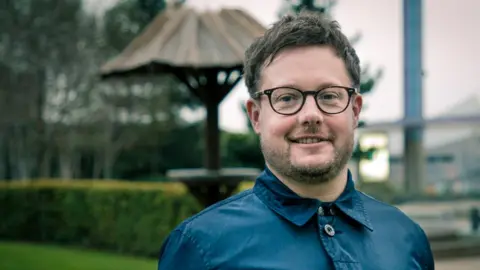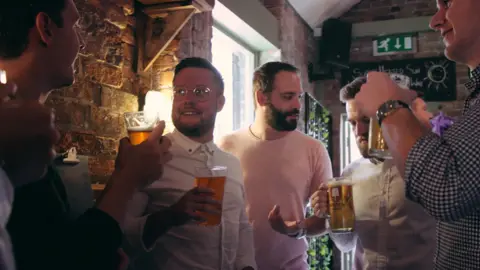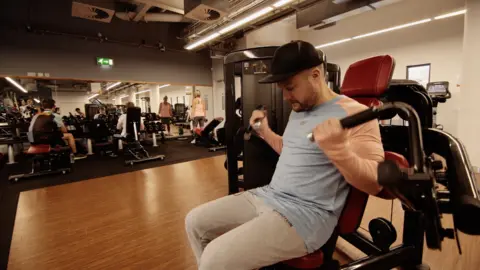'Alcohol triggers panic attacks but I won't stop drinking'
 BBC
BBCMat admits that alcohol makes his anxiety and depression worse, but says giving it up is something he's very unlikely to do.
"I'm not ashamed to say I've used alcohol substantially throughout the years to aid me," he says. "However, I know it's a trigger."
The ex-serviceman is one of four Radio 1 listeners we've been following throughout 2017 as they deal with the highs and lows of mental health conditions.
The iPlayer documentary My Mind and Me also includes some footage Mat filmed while he was having a panic attack to try to make people understand how bad they really are.
"When it's at its worst it's completely debilitating. I wouldn't shower for days. I'd drink really heavily.
"The panic attacks, the suicidal thoughts, all come at once and there's not much you can do about it really.
"Alcohol has played a big part. I know it's a trigger - especially the depression.
"The majority of panic attacks and manic depressive stages come after a drinking session.
"It's a downward spiral. As soon as you start to counteract the depression with the beer, you wake up sober and feel 10 times worse."
At his lowest point, Mat says he was drinking all day from the moment he got up.

Even though he knows alcohol can have this effect Mat's not sure he could give it up.
"I may be that guy that wants to kill himself every now and then, but still I love my friends and I love going out.
"It's all I've done since I've been trying to battle it.
"I remember when I was 18 going into Wetherspoon and I was really socially anxious. I'd have to get exceptionally drunk just to feel like I wasn't out of place.
"It's like alcohol is the way out, but I know it isn't - it just makes things 20 times worse."

Dr Deepti Shah-Armon, from the Arch Hillingdon addiction clinic, says: "The moment you recognise that you're using drink to cope with an emotion then you need to think if there's another way to deal with this emotion."
She says if you recognise early enough that you may have a problem there are things you can try before heading to your GP or a clinic like the one she works for.
"You can actually reduce [your alcohol intake] yourself. It's very safe to do that and doing healthy things in your life like exercising are so fundamentally important."
Mat has started going to the gym but he still can't quite shake the alcohol.
"I don't think I could give it up because I think I'm mentally dependent on alcohol to help me get through things."
How you can help someone having a panic attack
As you can see, a panic attack can be a distressing experience for the sufferer.
But Mat says simple support from whoever's nearby can make all the difference.
"Saying 'Calm down, it'll be fine,' won't work," he says. "The best thing to do is just be next to them, be there for them.
"Don't say much, just comfort them and they will come round. If you say, 'It'll be fine in the morning,' it'll make it worse."
And Deepti says there are steps sufferers can take to ease their symptoms when having an attack.
"The thing to remember with a panic attack is that it will pass," she says. "Just remind yourself it will pass, you're not going to die from it."
If you're struggling with your mental health or addiction you can find help at BBC Advice.
Find us on Instagram at BBCNewsbeat and follow us on Snapchat, search for bbc_newsbeat
